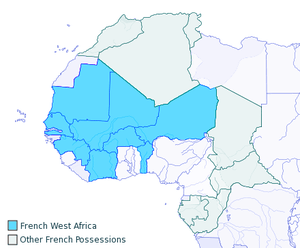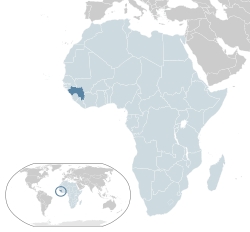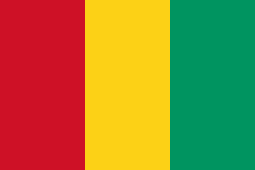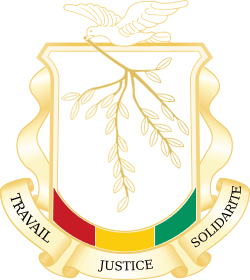History of Guinea
The modern state of Guinea did not come into existence until 1958, but the history of the area stretches back well before European colonization. Its current boundaries were determined during the colonial period by the Berlin Conference (1884–1885) and the French, who ruled Guinea until 1958.
West African empires
What is now Guinea was on the fringes of the major West African empires. The Ghana Empire is believed to be the earliest of these which grew on trade but contracted and ultimately fell due to the hostile influence of the Almoravids. It was in this period that Islam first arrived in the region.
The Sosso kingdom (12th to 13th centuries) briefly flourished in the void but the Islamic Mandinka Mali Empire came to prominence when Soundiata Kéïta defeated the Sosso ruler, Sumanguru Kanté at the semi-historical Battle of Kirina in c. 1235. The Mali Empire was ruled by Mansa (Emperors), the most famous being Kankou Moussa, who made a famous hajj to Mecca in 1324. Shortly after his reign the Mali Empire began to decline and was ultimately supplanted by its vassal states in the 15th century.
The most successful of these was the Songhai Empire, expanding its power from about 1460, and eventually surpassing the Mali Empire in both territory and wealth. It continued to prosper until a civil war over succession followed the death of Askia Daoud in 1582. The weakened empire fell to invaders from Morocco at the Battle of Tondibi just 3 years later. The Moroccans proved unable to rule the kingdom effectively, however, and it split into many small kingdoms.
Kingdoms in Guinea
After the fall of the major West African empires, various kingdoms existed in what is now Guinea.
Futa Jallon
Fulani Muslims migrated to Futa Jallon in Central Guinea and established an Islamic state from 1735 to 1898 with a written constitution and alternate rulers.
Wassoulou Empire
The Wassoulou empire was a short-lived (1878–1898) empire, led by Samory Touré in the predominantly Malinké area of what is now upper Guinea and southwestern Mali (Wassoulou). It moved to Ivory Coast before being conquered by the French.
Colonial era

The slave trade came to the coastal region of Guinea with European colonialists in the 16th century. Slavery had always been part of everyday life but the scale increased as slaves were exported to work elsewhere in the triangular trade.
Guinea's colonial period began with French military penetration into the area in the mid-19th century. French domination was assured by the defeat in 1898 of the armies of Samori Touré, Mansa (or Emperor) of the Ouassoulou state and leader of Malinké descent, which gave France control of what today is Guinea and adjacent areas.
France negotiated Guinea's present boundaries in the late 19th and early 20th centuries with the British for Sierra Leone, the Portuguese for their Guinea colony (now Guinea-Bissau), and Liberia. Under the French, the country formed the Territory of Guinea within French West Africa, administered by a governor general resident in Dakar. Lieutenant governors administered the individual colonies, including Guinea.
Independence (1958)
In 1958 the French Fourth Republic collapsed due to political instability and its failures in dealing with its colonies, especially Indochina and Algeria. The founding of a Fifth Republic was supported by the French people, while French President Charles de Gaulle made it clear on 8 August 1958 that France's colonies were to be given a stark choice between more autonomy in a new French Community and immediate independence in the referendum to be held on 28 September 1958.
The other French colonies chose the former but Guinea — under the leadership of Ahmed Sékou Touré whose Democratic Party of Guinea (PDG) had won 56 of 60 seats in 1957 territorial elections — voted overwhelmingly for independence. The French withdrew quickly, and on October 2, 1958, Guinea proclaimed itself a sovereign and independent republic, with Sékou Touré as president.
Sékou Touré's rule (1958–1984)
People's Revolutionary Republic of Guinea République populaire révolutionnaire de Guinée (French) | |||||||||
|---|---|---|---|---|---|---|---|---|---|
Motto: Work, Justice, Solidarity | |||||||||
Anthem: Liberté | |||||||||
 | |||||||||
| Capital | Conakry | ||||||||
| Common languages | French | ||||||||
| Government | Unitary one-party socialist republic | ||||||||
| President | |||||||||
• 1958–1984 | Sékou Touré | ||||||||
| Historical era | Cold War | ||||||||
• Established | 1958 | ||||||||
• Disestablished | 1984 | ||||||||
| Currency | Guinean franc | ||||||||
| Calling code | 242 | ||||||||
| ISO 3166 code | GN | ||||||||
| |||||||||
| Today part of | |||||||||
U.S. President Dwight D. Eisenhower was hostile to Touré, so the African nation quickly turned to the Soviet Union—making it the Kremlin's first success story in Africa. Following France's withdrawal, Guinea quickly aligned itself with the Soviet Union and adopted socialist policies. This alliance was short lived, however, as Guinea moved towards a Chinese model of socialism. Nevertheless, President John F. Kennedy and his Peace Corps director Sargent Shriver tried even harder than the Kremlin's Nikita Khrushchev. By 1963 Guinea had shifted away from Moscow into a closer friendship with Washington.[1] Guinea relied more and more on aid and investment from the U.S. Even the relationship with France improved, after the election of Valéry Giscard d'Estaing as president, trade increased and the two countries exchanged diplomatic visits.
By 1960, Touré had declared the PDG the only legal party. For the next 24 years, the government and the PDG were one. Touré was reelected unopposed to four seven-year terms as president, and every five years voters were presented with a single list of PDG candidates for the National Assembly. Advocating a hybrid African Socialism domestically and Pan-Africanism abroad, Touré quickly became a polarising leader, and his government became intolerant of dissent, imprisoning hundreds, and stifling free press.
At the same time, the Guinean government nationalised land, removed French appointed and traditional chiefs from power, and broke ties with French government and companies. Vacillating between support for the Soviet Union and (by the late 1970s) the United States, Guinea's economic situation became as unpredictable as its diplomatic line. Alleging plots and conspiracies against him at home and abroad, Touré's regime targeted real and imagined opponents, driving thousands of political opponents into exile.
In 1970, Portuguese forces, from neighboring Portuguese Guinea, staged Operation Green Sea, a raid into Guinea with the support of exiled Guinean opposition forces. Among other goals, the Portuguese military wanted to kill or capture Sekou Toure due his support of the PAIGC, a guerilla movement operating inside Portuguese Guinea.[2] After several days of fierce fighting, the Portuguese forces retreated without achieving most of their goals. The regime of Sékou Touré increased the number of internal arrests and executions.
The Guinean Market Women's Revolt in 1977 resulted in the regime's softening of economic restrictions and began a turn away from the radical socialism previously practiced by the government.
Sékou Touré died on March 26, 1984 after a heart operation in the United States, and was replaced by Prime Minister Louis Lansana Beavogui, who was to serve as interim president pending new elections.
Lansana Conté's rule (1984–2008)
The PDG was due to elect a new leader on April 3, 1984. Under the constitution, that person would have been the only candidate for president. However, hours before that meeting, Colonels Lansana Conté and Diarra Traoré seized power in a bloodless coup. Conté assumed the role of president, with Traoré serving as prime minister until December.
Conté immediately denounced the previous regime's record on human rights, released 250 political prisoners and encouraged approximately 200,000 more to return from exile. He also made explicit the turn away from socialism, but this did little to alleviate poverty and the country showed no immediate signs of moving towards democracy.
In 1992, Conté announced a return to civilian rule, with a presidential poll in 1993 followed by elections to parliament in 1995 (in which his party – the Party of Unity and Progress – won 71 of 114 seats.) Despite his stated commitment to democracy, Conté's grip on power remained tight. In September 2001 the opposition leader Alpha Condé was imprisoned for endangering state security, though he was pardoned 8 months later. He subsequently spent a period of exile in France.
In 2001 Conté organized and won a referendum to lengthen the presidential term and in 2003 begun his third term after elections were boycotted by the opposition. In January 2005, Conté survived a suspected assassination attempt while making a rare public appearance in the capital Conakry. His opponents claimed that he was a "tired dictator" [3] whose departure was inevitable, whereas his supporters believed that he was winning a battle with dissidents. Guinea still faces very real problems and according to Foreign Policy is in danger of becoming a failed state.[4]
In 2000 Guinea became embroiled in the instability which had long blighted the rest of West Africa as rebels crossed the borders with Liberia and Sierra Leone and it seemed for a time that the country was headed for civil war.[5] Conté blamed neighbouring leaders for coveting Guinea's natural resources, though these claims were strenuously denied.[6] In 2003 Guinea agreed plans with her neighbours to tackle the insurgents. In 2007 there were big protests against the government, resulting in the appointment of a new prime minister.[7]
Conté's death and the 2008 coup d'état
In a coup d'état several hours following Touré's death, Lansana Conté became the President. The constitution and parliament were suspended and a committee for national recovery was established. Conté remained in power until his death on 22 December 2008.[8]
In several hours following his death, Moussa Dadis Camara seized control of Guinea as the head of a junta.[9] On 28 September 2009, the junta ordered its soldiers to attack people who had gathered to protest Camara's presumed candidacy in the upcoming presidential elections.[10][11] The soldiers went on a rampage of rape, mutilation, and murder.[12]
On 3 December 2009, an aide shot Camara during a dispute about the rampage of September 2009. Camara went to Morocco for medical care.[12][13] Vice-President (and defense minister) Sékouba Konaté flew back from Lebanon to run the country in Camara's absence.[14]
On 12 January 2010 Camara was flown from Morocco to Burkina Faso.[15] After meeting in Ouagadougou on 13 and 14 January, Camara, Konaté and Blaise Compaoré, President of Burkina Faso, produced a formal statement of twelve principles promising a return of Guinea to civilian rule within six months. It was agreed that the military would not contest the forthcoming elections, and Camara would continue his convalescence outside Guinea.[16] On 21 January 2010 the military junta appointed Jean-Marie Doré as Prime Minister of a six-month transition government, leading up to elections.[17]
The presidential election was set to take place on 27 June and 18 July 2010,[18][19] it was held as being the first free and fair election since independence in 1958. The first round took place normally on 27 June 2010 with ex Prime Minister Cellou Dalein Diallo and his rival Alpha Condé emerging as the two runners-up for the second round.[20] However, due to allegations of electoral fraud, the second round of the election was postponed until 19 September 2010.[21] A delay until 10 October was announced by the electoral commission (CENI), subject to approval by Sékouba Konaté.[22] Yet another delay until 24 October was announced in early October.[23] Elections were finally held on 7 November. Voter turnout was high, and the elections went relatively smoothly.[24]
16 November 2010, Alpha Condé, the leader of the opposition party Rally of the Guinean People (RGP), was officially declared the winner of a 7 November run-off in Guinea's presidential election. He had promised to reform the security sector and review mining contracts if elected.[25]
On the night of 18 July 2011, President Condé's residence was attacked in an attempted coup. The attack included a fierce firefight and rocket propelled grenades. The president was unharmed.[26] Sixteen people have been charged with the attempted assassination. Most of those indicted are close associates of Konaté.[27]
The National Assembly of Guinea, the country's legislative body, has not met since 2008 when it was dissolved after the military coup in December. Elections have been postponed many times since 2007 and, most recently, were scheduled for 8 July 2012. In April 2012, President Condé postponed the elections indefinitely, citing the need to ensure that they were "transparent and democratic".[28]
In February 2013, a plane carrying the head of the Guinean armed forces, General Kelefa Diallo, and nine other military officials, crashed on its way to the Liberian capital, Monrovia.[29]
2013 protests
The opposition coalition withdrew from the electoral process in mid-February, mainly due to President Conde's insistence on using a suspicious South African firm Waymark Infotech to draw up the registered voter list.[30][31] In late February 2013, political violence erupted in Guinea after protesters took to the streets to voice their concerns over the transparency of the upcoming May 2013 elections. The demonstrations were fueled by the opposition coalition's decision to step down from the electoral process in protest at the lack of transparency in the preparations for elections.[32]
Nine people were killed during the protests, while around 220 were injured, and many of the deaths and injuries were caused by security forces using live fire on protesters.[30][33] The political violence also led to inter-ethnic clashes between the Fula and Malinke peoples, the latter forming the base of support for President Condé, with the former consisting mainly of the opposition.[34] On 26 March 2013 the opposition party backed out of the negotiation with the government over the upcoming 12 May election. The opposition claimed that the government has not respected them, and have not kept any promises they agreed to. This is expected to lead to more protests and fighting in the streets of Guinea.[35]
2014 Ebola outbreak
Beginning in July 2014, Guinea suffered the most severe recorded outbreak of Ebola in history, which rapidly spread to neighbouring countries Liberia and Sierra Leone.[36] The epidemic was over by June 2016.[37]
See also
- List of heads of government of Guinea
- List of heads of state of Guinea
- Politics of Guinea
- Conakry history and timeline
General:
Further reading
- Chafer, Tony. The End of Empire in French West Africa: France's Successful Decolonization. Berg (2002). ISBN 1-85973-557-6
- O'Toole, Thomas and Bah-Lalya, Ibrahima. Historical Dictionary of Guinea (3rd ed. Scarecrow Press. 1995). online
External links
- Philip E. Muehlenbeck, "Kennedy and Toure: A success in personal diplomacy." Diplomacy and Statecraft 19.1 (2008): 69-95. online
- "Mr Sekou Touré, who gave the PAIGC unstinted support during its war against the Portuguese,..."Black revolt Archived 2009-03-08 at the Wayback Machine, The Economist (Nov 22nd 1980)
- "Archived copy". Archived from the original on 2007-06-16. Retrieved 2005-08-17.CS1 maint: archived copy as title (link)
- "Failed States list 2008". Fund for Peace. Archived from the original on 2008-06-26. Retrieved 2008-06-27.
- "Civil war fears in Guinea". BBC News. October 23, 2000. Archived from the original on 2004-06-19. Retrieved April 2, 2010.
- "Guinea head blames neighbours". BBC News. January 6, 2001. Retrieved April 2, 2010.
- "Austrian Study Centre for Peace and Conflict Resolution (ASPR) | Peace Castle Austria" (PDF). ASPR. Archived (PDF) from the original on 2007-06-15. Retrieved 2013-09-09.
- McGreal, Chris (23 December 2008). "Lansana Conté profile: Death of an African 'Big Man'". The Guardian. London. Archived from the original on 2013-09-05. Retrieved 23 December 2009.
- Walker, Peter (23 December 2008). "Army steps in after Guinea president Lansana Conté dies". The Guardian. London. Archived from the original on 2009-08-26. Retrieved 23 December 2009.
- "Guinea massacre toll put at 157". London: BBC. 29 September 2009. Archived from the original on 2009-10-02. Retrieved 23 December 2009.
- "Guinea: September 28 Massacre Was Premeditated". HRW. October 27, 2009. Archived from the original on 2017-09-11. Retrieved 2017-08-26.
- MacFarquhar, Neil (21 December 2009). "U.N. Panel Calls for Court in Guinea Massacre". The New York Times. Archived from the original on 2011-05-11. Retrieved 23 December 2009.
- "Guinean soldiers look for ruler's dangerous rival". malaysianews.net. 5 December 2009. Archived from the original on 23 July 2011. Retrieved 23 December 2009.
- Guinea's presidential guard explains assassination motive Archived 2013-09-10 at the Wayback Machine . Xinhua. 16 December 2009.
- "Brahima Ouedraogo, "Guinea leader arrives in Burkina Faso", Associated Press/Yahoo News (12 January 2009)". Archived from the original on 2010-01-16. Retrieved 2017-01-14.
- celine says. ""In Full: Declaration Made in Burkina Faso Between Dadis Camara and Sekouba Konate", Newstime Africa (16 January 2010)". Newstimeafrica.com. Archived from the original on 18 January 2010. Retrieved 28 March 2010.
- "Guinea junta officially names Dore prime minister" Archived 2010-05-22 at the Wayback Machine, Reuters, 21 January 2010.
- afrol News – Election date for Guinea proposed Archived 2014-07-29 at the Wayback Machine. Afrol.com. Retrieved on 28 June 2011.
- Guinea to hold presidential elections in six months _English_Xinhua Archived 2013-09-10 at the Wayback Machine . News.xinhuanet.com (16 January 2010). Retrieved on 28 June 2011.
- "Guinea election goes to run-off as Diallo falls short". BBC News. 3 July 2010. Archived from the original on 2013-09-14. Retrieved 2018-06-21.
- "Guinea sets date for presidential run-off vote". BBC News. 9 August 2010. Archived from the original on 2018-11-27. Retrieved 2018-06-21.
- Saliou Samb, "Guinea election body proposes 10 October run-off", Reuters (20 September 2010). Reuters.com. Retrieved on 28 June 2011.
- "Guinea run-off election date set", Al Jazeera (5 October 2010) Archived 2011-05-13 at the Wayback Machine. English.aljazeera.net (5 October 2010). Retrieved on 28 June 2011.
- "Guinea sees big turnout in presidential run-off poll", BBC (7 November 2010) Archived 2018-10-31 at the Wayback Machine. Bbc.co.uk (7 November 2010). Retrieved on 28 June 2011.
- Conde declared victorious in Guinea – Africa | IOL News Archived 2014-09-19 at the Wayback Machine. IOL.co.za (16 November 2010). Retrieved on 28 June 2011.
- Guinea: Conde's Residence Hit By Rocket Fire Archived 2012-10-20 at the Wayback Machine. allAfrica.com (19 July 2011)..
- Jean, Tamba. (5 August 2011) Guinea: 16 Charged With Assassination Attempt On Leader Archived 2012-10-20 at the Wayback Machine. allAfrica.com..
- RNW Africa Desk (28 April 2012). "Guinea president postpones parliamentary elections indefinitely". Radio Netherlands Worldwide. Archived from the original on 30 April 2012. Retrieved 22 August 2012.
- Guinea: Tragedy Hits Guinea; Liberia Mourns Plane Crash – Claims 11 Lives, Sirleaf Declares Holiday, Africa: AllAfrica.com, 2013
- "Security forces break up Guinea opposition funeral march". Reuters. 8 March 2013. Archived from the original on 2013-04-24. Retrieved 2013-03-19.
- Salon (15 February 2013). "Guinea electoral body appoints South African firm". Salon. Archived from the original on 11 April 2013.
- "Guinea opposition pulls out of legislative elections process". Reuters. Reuters. 24 February 2013. Archived from the original on 2015-11-23. Retrieved 2017-07-01.
- Daniel Flynn (5 March 2013). "Two more killed in Guinea as protests spread". Reuters. Archived from the original on 2015-11-23. Retrieved 2017-07-01.
- "Ethnic Clashes Erupt in Guinea Capital". Voice of America. Reuters. 1 March 2013. Archived from the original on 2013-12-31. Retrieved 2014-06-29.
- Bate Felix (26 March 2013). "Guinea election talks fail, opposition threatens protests". Reuters. Archived from the original on 2015-09-24. Retrieved 2017-07-01.
- "Archived copy". Archived from the original on 2014-08-09. Retrieved 2017-09-09.CS1 maint: archived copy as title (link)
- "WHO Director-General addresses the Executive Board". Archived from the original on 2016-06-08. Retrieved 9 June 2016.
- Elizabeth Blunt. Civil war fears in Guinea. BBC News. October 23, 2000.
- Guinea head blames neighbours. BBC News. January 6, 2001.
- Stopping Guinea’s slide. International Crisis Group, Africa Report No. 94. June 14, 2005.
- Adama Sow: Chancen und Risiken von NGOs – Die Gewerkschaften in Guinea während der Unruhen 2007 – EPU Research Papers: Issue 03/07, Stadtschlaining 2007 (in German)
- André R. Lewin. Sékou Touré’s “No”. African Geopolitics. 2005.
- Bad government, bad neighbour. The Economist. July 21, 2005.
- Background Note: Guinea
- "Guinea: Living on the edge – Chronology: 19th and 20th century". IRIN. January 2005. Retrieved 2007-02-24.

